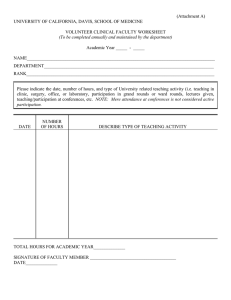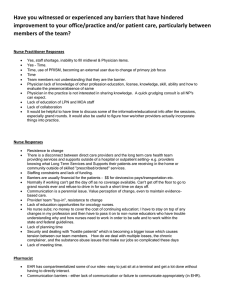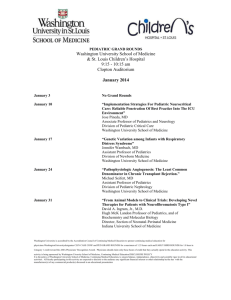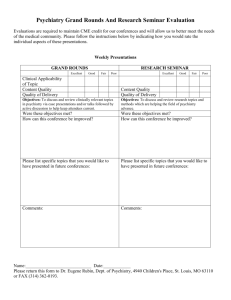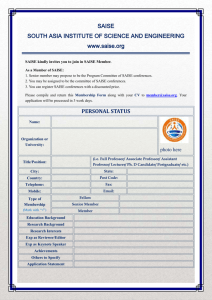Please identify opportunities for Interprofessional Education. (Education planned
advertisement
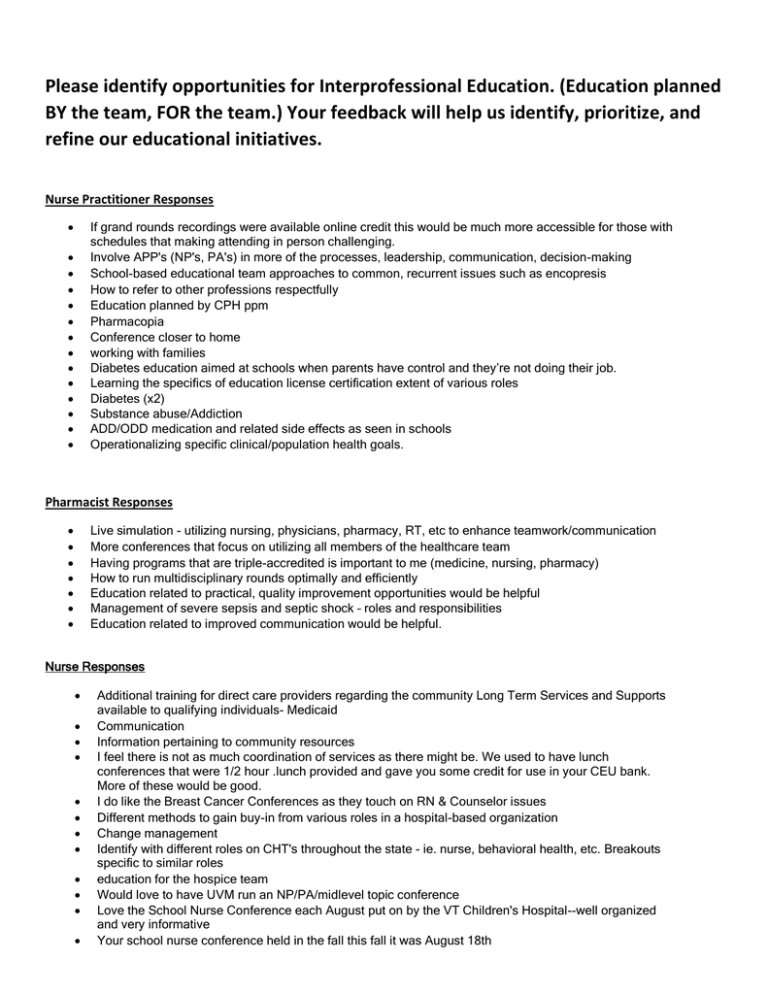
Please identify opportunities for Interprofessional Education. (Education planned BY the team, FOR the team.) Your feedback will help us identify, prioritize, and refine our educational initiatives. Nurse Practitioner Responses If grand rounds recordings were available online credit this would be much more accessible for those with schedules that making attending in person challenging. Involve APP's (NP's, PA's) in more of the processes, leadership, communication, decision-making School-based educational team approaches to common, recurrent issues such as encopresis How to refer to other professions respectfully Education planned by CPH ppm Pharmacopia Conference closer to home working with families Diabetes education aimed at schools when parents have control and they’re not doing their job. Learning the specifics of education license certification extent of various roles Diabetes (x2) Substance abuse/Addiction ADD/ODD medication and related side effects as seen in schools Operationalizing specific clinical/population health goals. Pharmacist Responses Live simulation - utilizing nursing, physicians, pharmacy, RT, etc to enhance teamwork/communication More conferences that focus on utilizing all members of the healthcare team Having programs that are triple-accredited is important to me (medicine, nursing, pharmacy) How to run multidisciplinary rounds optimally and efficiently Education related to practical, quality improvement opportunities would be helpful Management of severe sepsis and septic shock – roles and responsibilities Education related to improved communication would be helpful. Nurse Responses Additional training for direct care providers regarding the community Long Term Services and Supports available to qualifying individuals- Medicaid Communication Information pertaining to community resources I feel there is not as much coordination of services as there might be. We used to have lunch conferences that were 1/2 hour .lunch provided and gave you some credit for use in your CEU bank. More of these would be good. I do like the Breast Cancer Conferences as they touch on RN & Counselor issues Different methods to gain buy-in from various roles in a hospital-based organization Change management Identify with different roles on CHT's throughout the state - ie. nurse, behavioral health, etc. Breakouts specific to similar roles education for the hospice team Would love to have UVM run an NP/PA/midlevel topic conference Love the School Nurse Conference each August put on by the VT Children's Hospital--well organized and very informative Your school nurse conference held in the fall this fall it was August 18th Professional Learning Communities for a consistent group of participants on key clinical indicators where the patient outcomes are related to the quality of inter/intra/disciplinary team work Communication techniques when mental illness or substance use are involved Create and maintain one plan of care to be implemented by the entire medical, social/psych team from inpatient to outpatient services home based OBSTETRICAL DIAGNOSTIC TESTING e.g. routine tests, genetics, ultrasounds, specific screens, Housing Options – do we really need so many SILOS? Can’t it all be under one roof? Mental Health support is a tough one. Very hard to collaborate when they don’t put in their 50%. Evidence-based care pearls to open dialog for change. License utilization. Highlight one team each conference. End of life support for families with young children. Bereavement for Children. Healthcare transformation. Diabetes training. Asthma training. Nutritional training. Allergy training. Keeping up to date with first aid and CPR training: seizure protocols, taking care of ourselves. Technology Advancements Support for adults dealing with traumatic childhood experiences Maternal Fetal Medicine Updates. Resiliency and teaching coping mechanisms for adults supporting elderly parents. Women’s Health Updates including Pharmaceutical updates/reviews. Physician Responses Work with my gang at the NYSAFP Education Commission! Ultrasound course Team approach to dealing with difficult patients Spreading the good work done by the UVMMC primary care offices (a revitalizing primary care initiative) Specialty groups need to better communicate long term follow up with PCP Shared Grand Rounds schedule management Rapid response team huddles for hospitalized children facing acute decompensations quality improvement projects Pediatric conferences at least 3 times/year that introduce common pediatric problems and best practices Patient centered care - inpatient or outpatient settings Our ER did a SIM lab day for high-risk/low-frequency scenarios in the ER, and we did it as teams of MD/PA providers and nursing - it was great! Nurses loved being included. Optimizing workflow Online modules with asynchronous components for different team members ongoing input regarding new best practice findings with emphasis on those needed in rural primary care My team does at a weekly meeting in the context of case presentations on thrombosis and hemostasis problems and via multidisciplinary conferences. If we could get MOC credit for this it would be great. Not sure what the rules are on that. We don't need more CME Multidisciplinary team development More on-line individual activities for credit that can be completed from home. Introduce concept of "clinical microsystem" to team Interprofessional quality improvement project collaboration Inter-disciplinary conferences Interactive workshops good for new techniques ICDM 10 I love the Academic Detailing program and would do one very month is available. I like series of specialty conferences - 'for primary care' Getting Grand Rounds online with credit Focus on patient outcomes (all team members can contribute) Effective communication around transitions Desk top ability to watch grand rounds (steaming) Crisis Management Conferences Support practice changes and integrated HIT between practices Combined treatment for patients with complex biopsychosocial problems. PCP needs a strong voice to keep specialty groups realistic about follow up guidelines. Interdisciplinary workshops/simulation. Triage systems. Pediatric family centered rounds. Teaching and learning with students and residents. ADHD from a primary pediatric perspective. Interdisciplinary rounding (inpatient) Making best (meaningful, sensible, practical) use of technology (e.g., PRISM) Continued ways to improve and increase communications between our rural practice and the medical center. Interprofessional patient and family-centered care. Forums where PCP and specialists meet to discuss referral, consultation and follow up plans and communication EMR training. Making decisions based on aggregate patient information. Appropriate debriefing. Focus on community collaboration as a competency. Collaboration between medical and counseling staff. Regional pediatric referral management – coordinating care from outpatient to ED management. New practice guidelines for common pediatric problems ie. Ottis media, asthma, UTI How to effectively work in teams. Consider transportation but for patients and transports as a area that is sometimes a barrier. Interprofessional team building and communication skills. Basic science of oncology and clinical aspects of oncology. Come visit the southern half of the state more. Programs at the Equinox are highly appreciated. Tools to easily gather and trend patient-generated information about function and symptoms.
